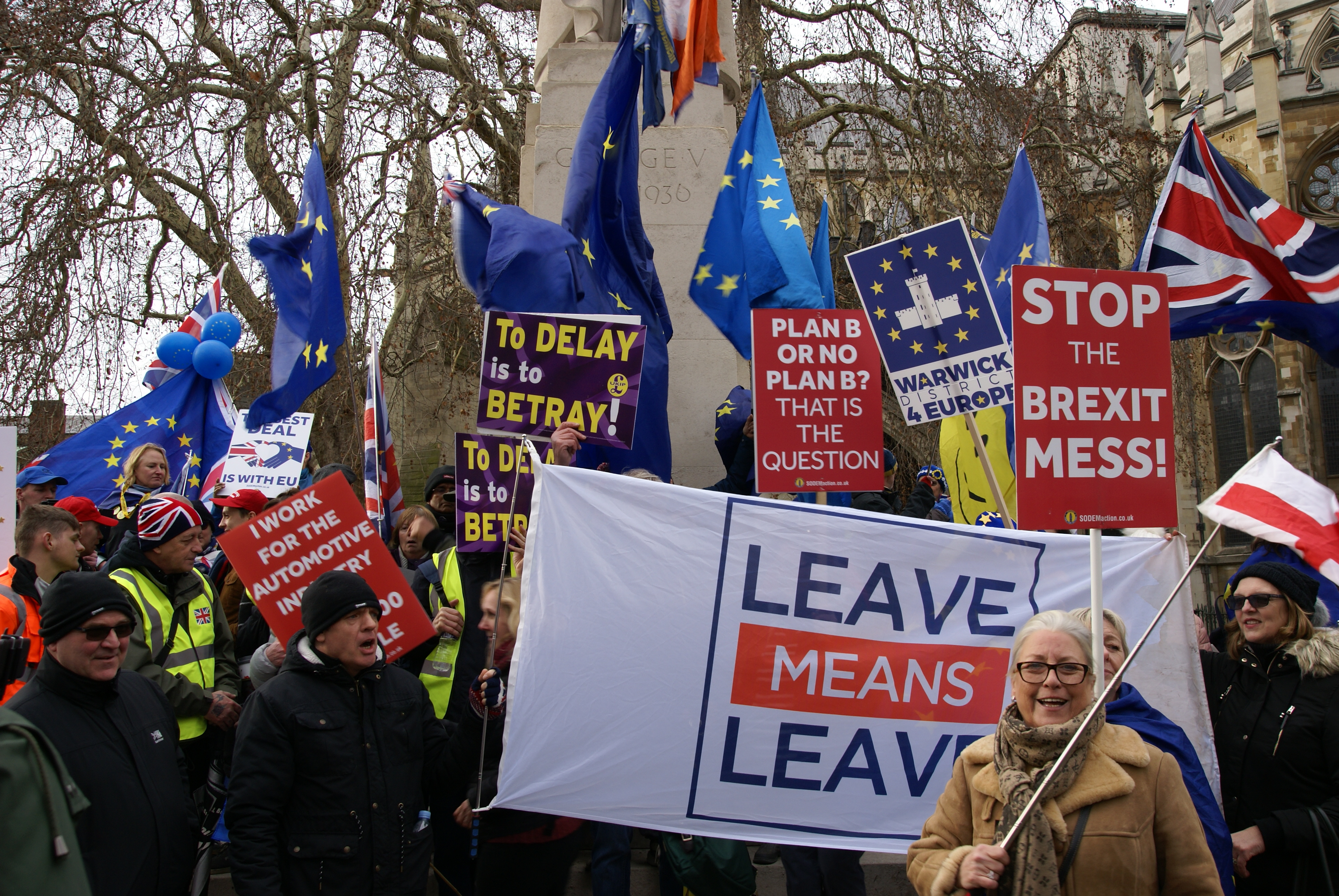Brexit Endgame: One Month Out with No Clarity in Sight
Editor’s Note: This article originally appeared on Order from Chaos.

Published by The Lawfare Institute
in Cooperation With

Editor’s Note: This article originally appeared on Order from Chaos.
With barely a month remaining before the United Kingdom is scheduled to leave the European Union (EU), London is no closer to having a ratified deal, an agreement to extend negotiations, or preparations in place to manage a hard exit. British Prime Minister Theresa May has promised to hold the next parliamentary vote on her Brexit deal by March 12, a mere 17 days before the departure date. Yet the EU has shown little readiness to budge on her demands for changes to the Northern Ireland backstop. I spent last week meeting with officials, politicians, and analysts in London; no one knows how this saga will unfold.
What Are May’s Options?
Following the historic defeat of her Brexit deal in the House of Commons on January 15, May had two possible options. First, she could seek changes to the withdrawal agreement’s unpopular backstop provision on Northern Ireland to assuage hardline Brexiteers in her Conservative party and the 10 MPs from Northern Ireland’s Democratic Unionist Party (DUP) who prop up her minority government. Alternatively, she could tack left to garner support from the opposition Labour Party by pursuing a softer Brexit via a permanent customs union with the EU. In early February, Labour leader Jeremy Corbyn sent May a letter that laid out five conditions for his party’s support of her deal—including a customs union.
When May outlined her next steps on January 21, she told members of Parliament (MPs) that she would seek changes to the backstop. Parliament endorsed her approach in a January 29 vote that called for the backstop to be “replaced with alternative arrangements.” The main obstacle? The EU has repeatedly said it will not renegotiate the withdrawal agreement, including the backstop. In addition, May must ensure sufficient parliamentary support not only to ratify the deal but also to hold together long enough to pass implementing legislation.
Can the UK and EU Reach a Compromise on the Backstop?
On February 20, May and European Commission President Jean-Claude Juncker discussed “guarantees” to reinforce the temporary nature of the backstop, how alternative arrangements could replace the backstop “in future,” and whether “additions or changes” to the political declaration could increase confidence about the sides’ desires to establish their future relationship promptly. In other words, the EU position remains firm. Brussels also continues to ask what changes May requires and whether those would make the deal acceptable. On February 24, European Council President Donald Tusk warned May the EU would not offer concessions until she holds another vote and demonstrates majority support for specific tweaks.
One option is an addendum to the withdrawal agreement, which puts into legalese assurances given by Tusk in an early January letter to May. All eyes are on U.K. Attorney General Geoffrey Cox, a leading Brexiteer MP whose views carry weight with his hardline Conservative colleagues. Last fall, he provided legal advice to the U.K. cabinet; it was published after Parliament held ministers in contempt for providing an overview rather than his full text. (The British have been sensitive about legal advice since former Prime Minister Tony Blair’s Attorney General justified the U.K.’s participation in the Iraq War absent a U.N. Security Council resolution.) Although Cox’s statement largely reiterated what was known, controversyerupted over his view that the backstop could last “indefinitely” whereas the withdrawal agreement describes the measures as “temporary” (i.e., in place “unless and until” there are alternative arrangements). In recent days, Cox has met EU officials in the hopes of receiving further assurances that would enable him to adjust his previous advice and allow concerned MPs to support the revised plan.
What Are The Key Dates to Watch?
Parliamentary amendments: On February 26, May will update Parliament on her negotiations with the EU and present an amendable motion for debate on February 27 (as happened on January 29 and February 14). There are two amendments to watch:
- Cooper-Letwin amendment: If Parliament does not ratify a Brexit deal by March 13, MPs could consider legislation requiring May to ask the EU to extend Article 50 (the legal process governing the U.K.’s withdrawal that currently expires on March 29) for a negotiable period. This amendment, which is proposed by Labour MP Yvette Cooper and Conservative MP Oliver Letwin, is the second attempt to prevent a no-deal Brexit. Cooper’s previous amendment was defeated on January 29 by 23 votes; although 17 Conservative rebels supported the measure, 14 Labour MPs from Leave-supporting constituencies opposed it. That version gave the prime minister until February 26 to pass a Brexit deal and specified a nine-month extension.
- Labour amendment: Corbyn’s amendment will detail Labour’s alternative approach; it will feature the five conditions from his letter to May, including a permanent customs union. In a surprise announcement on February 25, Corbyn pledged to back a second referendum if support for his plan fails. One possible option, which may be delayed until the next vote on May’s deal, is an amendment by pro-Remain Labour MPs Peter Kyle and Phil Wilson that says Parliament would ratify her agreement only if it were subject to a confirmatory referendum.
Meaningful vote: May promised to hold a second “meaningful vote” on her Brexit deal by March 12. The fate of the Cooper amendment—which, if passed, sets March 13 as the deadline for a deal—could affect her strategy. To the extent May is running down the clock to force MPs into supporting her deal over a disastrous exit, an extension would remove that imminent threat. On the other hand, it could encourage hard Brexiteers to back her deal rather than see Brexit slip away. The risky timing of a vote less than three weeks before the U.K.’s scheduled departure could also set the stage for no deal.
EU summit: On March 21, EU leaders will hold their next summit. They hope to finalize plans at this meeting, which will require knowing whether the U.K. has ratified May’s deal, May wants an extension, or leaders must prepare for a hard Brexit.
Brexit: Unless there is an agreed extension, the U.K. will leave the EU on March 29—one way or another.
Why Are MPs Quitting Their Parties? Will This Affect Votes on the Brexit Deal?
On February 18, seven Labour MPs resigned from the party and created a new group of independent members. They cited frustration with Corbyn’s lack of leadership on Brexit as well as his failure to address rising anti-Semitism in the party. Two days later, the “gang of seven” became 11 with another Labour MP and three Conservatives joining the so-called Independent Group. Additional members may follow.
The group does not have a leader nor has it formed a political party. However, it represents Parliament’s fourth-largest bloc—with more MPs than the DUP and the same number as the Liberal Democrats. Although members’ views on many issues vary, they share frustration with their parties’ leadership and growing tribalism in politics. They are also united by their support for a second referendum, which likely influenced the change in Corbyn’s stance. These resignations do not affect the current parliamentary arithmetic on May’s deal, as their views were already known and they have previously bucked the party whip.
So What Will Happen?
It has become a parlor game in London to predict the most likely Brexit outcome, with nearly everyone ranking options in a different order. The scenarios, listed according to my current guesstimate of likelihood, include:
- Deal: May’s amended deal is approved by parliament, aided by assurances (even if cosmetic) on the backstop and fears of a catastrophic hard Brexit.
- Extension: The March 29 deadline is extended to prevent the U.K. from crashing out of the EU. There are three possible options:
- Technical, short-term extension: Even if the House of Commons endorses the Brexit deal in mid-March, an extension will almost certainly be required to complete the process—including ratification by the European Parliament and the adoption of implementing legislation.
- Three-month extension: If the House of Commons does not approve a deal, May could ask the other 27 EU member states for an extension. This request would be required if the Cooper amendment and subsequent legislation are adopted. It would buy time for more wrangling in London, albeit to an uncertain end. EU members would likely agree, not least to ensure they are seen as helpful rather than punitive when the blame game begins.
- 21-month extension: The EU has been averse to lengthier extensions, given the complexities raised by European Parliament elections in late May and continued uncertainty for business. In recent days, there has been chatter about a 21-month extension—with December 2020 marking what would have been the end of the transition period under the current deal. This would provide stability (including continued U.K. contributions to the EU budgetary cycle) and allow time for leaders to discuss the future relationship.
- No deal: Although May and Parliament oppose a no-deal Brexit, it remains the default option until one is ratified. Some in Brussels are putting the odds at 60 percent, though many in London think that is too high. An accidental no-deal remains possible. The EU’s focus would become ensuring the U.K. meets its withdrawal treaty obligations, including protecting the Northern Ireland border and paying its 45 billion euro bill.
- Election: Although members of the Conservative and Labour parties do not favor elections, further splits could make polls more likely. If May is unable to pass her deal with tweaks to the backstop, she could be forced to pursue a softer Brexit; this could split the Conservative Party and trigger elections.
- Second referendum: Both May and Corbyn have long opposed a second referendum. Corbyn is now supporting a people’s vote to prevent a no-deal Brexit or “a damaging Tory Brexit,” but it will remain difficult to secure majority support in parliament.





